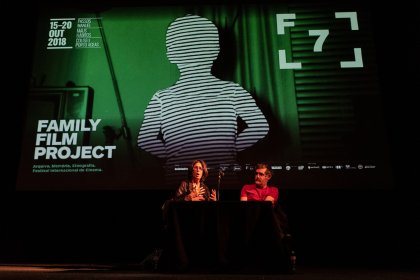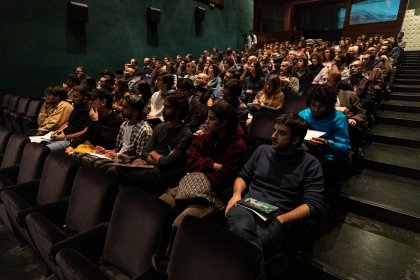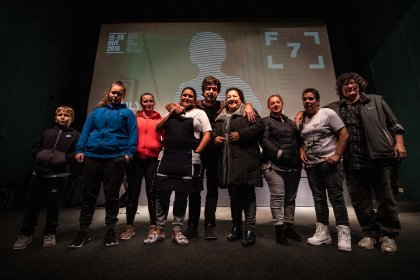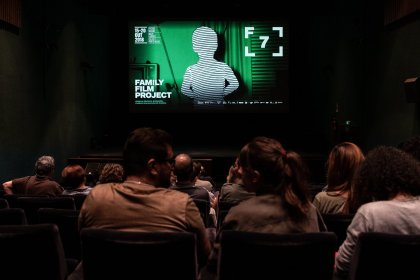Standard Fee
15€

Submissions deadline
09 Jun 20
1.2€
Festival Internacional de Cinema de Arquivo, Memória e Etnografia
07 Jan 2020
Call for entries
09 Jun 2020
Festival closed
30 Sep 2020
Notification date
12 Oct 2020
17 Oct 2020
Festival start: 12 October 2020 Festival end: 17 October 2020
FAMILY FILM PROJECT is a film festival which takes place every year in Porto, Portugal, with fast increase in visibility and internationalization since its first edition in 2012.
In addition to the mandatory Portuguese presence, the festival has been receiving films from around the world: Argentina, Brazil, Canada, Egypt, Spain, Holland, Indonesia, Italy, Israel, Iran, Lebanon, Mexico, Poland, Russia, Sweden, Taiwan, Venezuela, among many other nationalities.
The sessions of competitive programming traditionally split into three thematic areas: Lives and Places (focusing on the voyeuristic, biographical or documentary recording of habitats and quotidian), Connections (focused on interpersonal and community dynamics) and Memory and Archive (dedicated to creative views from testimony and found footage). There is also a competitive session devoted to fiction and animation.
The festival program always holds a prominent space for directors and guest artists of international renown, such as Jonas Mekas (2012), Péter Forgács (2013), Alina Marazzi (2015), João Canijo (2016), Regina Guimarães (2017), Bill Nichols (2018) and Paula Rabinowitz (2018), Daniel Blaufuks (2018), Jaimie Baron (2019), Cláudia Varejão (2019), among others.
With several lines of action, the festival also organizes various parallel cultural events in addition to the competitive sessions: art exhibitions (which may extend beyond the festival date), movies, concerts, installations, performances at various locations of the city, master classes, conferences and launches of books focused on ethnographic and anthropological dimension.
The festival has expanded through the city in locations like the Rivoli Theatre, Passos Manuel, Coliseu, auditorium Almeida Garrett or the theater Carlos Alberto, but also art galleries, city streets and emblematic bars. Thus, the festival also helps to increase, in its most particular way, the cultural dimension of the city and the touristic appeal associated with it.
With its usual competitive sessions, masterclasses, performance events and video installations, the festival is once again placed on the conceptual boundaries of cinema and its dialogue with other arts and areas of thought.
As in previous years, the festival is organized into three thematic zones: Lives and Places (focusing on voyeuristic, biographical or documentary recording of habitats and everyday life), Memory and Archive (dedicated to creative approaches from testimonies and found footage) and Connections (focused on interpersonal and community dynamics). There is also a space dedicated to the genres of fiction and animation, with a competitive selection that will have a particularly strong Portuguese representation this year. Besides the national films, the festival receives in its competitive program a selection of almost two dozen films of different nationalities, from short to feature film, from documentary to experimental genre, always in a register that extends from the intimate plasticity of “home movies” to the ethnographic landscape.
O festival Family Film Project concede um Grande Prémio do Júri (geralmente nos géneros de não-ficção) e um prémio secundário de melhor ficção ou animação. São também atribuídas menções honrosas.
PRAZOS E DATAS
Período anual de inscrições: 07 de janeiro a 9 de Junho 2020
Notificação de seleção: Final de Setembro
TEMÁTICAS E GÉNEROS
- Género documental, experimental, ficção ou animação.
- Filmes com recurso a found footage.
- Registos de família e “home movies”.
- Autorretratos ou trabalhos sobre identidades.
- Filmes em torno da intimidade, do privado e dos laços familiares.
- Panoramas sociais ou de comunidades.
- A família como problemática.
- Espaços privados e paisagens familiares.
CONDIÇÕES DE ADMISSÃO
- Não há limite de duração.
- Data de produção não deve exceder os três anos.
- Cada autor/realizador está limitado a inscrever duas obras.
- Os Filmes deverão ser submetidos com legendas em Inglês.
INSCRIÇÃO
- A inscrição deverá ser feita através da plataforma Festhome.
NOTIFICAÇÃO
Caso o filme seja selecionado, o autor/realizador será notificado até um mês antes do início do festival.
A organização entrará em contacto com os autores/realizadores ou entidades promotoras para se proceder ao reenvio de uma versão do filme com máxima qualidade. O filme deverá fazer-se acompanhar dos seguintes elementos:
- Sinopse (máx. 250 palavras).
- 3 fotogramas da obra (res. 300dpi).
- 1 Poster do filme (se disponível).
- 1 fotografia do realizador.
- Resumo biográfico atualizado do realizador (máx. 250 palavras).
- Trailer (link ou ficheiro) (se disponível).
- Declaração de autorização de projeção.
FORMATO DE EXIBIÇÃO
- Ficheiro MOV ou MP4
- Compressão PRORES; H.264, máxima qualidade.
- Resolução mínima: Full HD (1920*1080).
- Filme legendado em Inglês.
PRÉMIOS
O festival Family Film Project concede um Grande Prémio do Júri (geralmente nos géneros de não-ficção) e um prémio secundário de melhor ficção ou animação. São também atribuídas menções honrosas.
TERMOS E CONDIÇÕES
Os filmes selecionados poderão integrar extensões organizadas no âmbito do festival, como por exemplo a extensão VISIONA (Ciclo de Cine y Vídeo Álbum de família, Programa de la Imagen de Huesca, Espanha).
Fragmentos das obras selecionadas poderão ser usados para promoção do festival via TV, rádio ou internet.
A inscrição de um filme no FAMILY FILM PROJECT pressupõe o conhecimento e a aceitação do presente regulamento.
DÚVIDAS
registration@familyfilmproject.com
T +351 220 194 669 / M +351 938 076 613
Standard Fee
15€

Submissions deadline
09 Jun 20
Standard Fee
15€

Submissions deadline
09 Jun 20
![]() Festhome holds accountable fees festivals by holding the payment of the fees of most newer festivals until they have viewed the submissions, held their festivals and other methods.
Festhome holds accountable fees festivals by holding the payment of the fees of most newer festivals until they have viewed the submissions, held their festivals and other methods.



